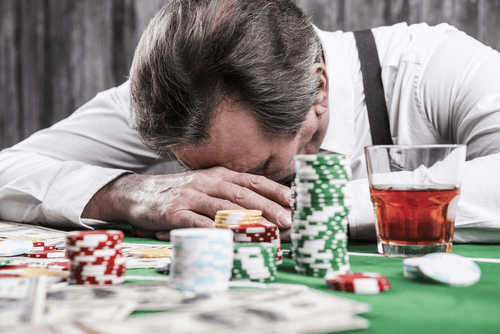Why is Gambling So Addictive?
Public hysteria surrounding gambling has led to the popular belief that you should never gamble because you’ll get addicted. Then, because you are addicted, you will start placing ridiculous wagers that lead to your demise. It all seems like a cut and dry “that’s all she wrote” type of story but it’s not.
Gambling isn’t this overarching evil that begs innocent victims to place a bet so they can begin their descent into degeneracy. In fact, there is a pretty scientific explanation for why some players find gambling so addictive and why others can resist the temptation to place another bet.
Below, we get into explaining what exactly makes gambling addictive by looking at some biological processes experts use to explain almost every single addictive behavior under the sun. In addition, we also look at how the nature of gambling works to reinforce addictive behaviors.

So, why is gambling addictive?
A lot of people uninformed of the nature of addiction have this tendency of simplifying addictive behavior. Often, they believe that addicts keep feeding their gambling addiction due to their love of money. However, this isn’t the case. On occasion, you’ll find players lose a lot of cash due to getting greedy. More often, in these situations, a regular player let a winning streak lead to bad and risky bets.
Rather, gambling addicts keep on gambling because of the effects the activity has on the brain’s internal reward system. This system connects to other key areas of the brain that influences pleasure and motivation.
This is very important as pleasurable experiences lead to the release of a neurotransmitter known as dopamine. The result of this action is that we feel motivated to repeat an experience or activity. Any activity can lead to a dopamine release, such as playing a musical instrument, watching a film or even eating cake.
However, it is believed that the dopamine release is much larger in people who are addicted to gambling or drugs when performing the activity they are addicted to.
Why do only some players get addicted to gambling?
So, if every player’s internal reward system is triggered when playing gambling games, why do only some players get addicted?
Well, unfortunately, some people are more prone to addictive behavior due to genetic factors. Two biological factors may influence this:
- Underperforming internal reward system
- Underactive prefrontal cortex (the part of the brain responsible for planning)
An underperforming internal reward system means that a stimulus (such as gambling) which causes it to overreact may prove to be too much for the person. They may want to repeat the behavior to feel the dopamine release because they don’t experience releases when performing regular activities.
If you have less activity in your prefrontal cortex, you are more likely to be impulsive. This means you are less likely to think of the consequences of your actions, such as gambling your savings away. The need to gamble more becomes so much more when the habit is fed by random winning streaks.

How Gambling Reinforces Addictive Behavior
Unfortunately, the key aspects of gambling may work well in intensifying addiction in problematic players. These include the following:
- Partial Reinforcement – the concept refers to situations in which behaviors are reinforced at random intervals by a reward. In a gambling sense, players get rewarded with winnings at random intervals. As they know there is a chance of getting a reward at any given time, they keep playing.
- Gambler’s Fallacy – we’ve mentioned this concept a lot on our system pages. The concept refers to the idea that a future outcome is affected by the previous outcome. This pattern of thinking is stupid but a lot of people find themselves falling into it once they have played games of chance for an extend period.
- Appearance of Control – as we’ve said time and again here, players cannot control outcomes of games of chance unless they are cheating. However, some players insist on believing that a particular strategy or betting system will lead them to success no matter what.
Falling into these patterns of thinking could prove detrimental to any person with an addictive personality. Ultimately, it could worsen problem gambling tendencies.
Practice Responsible Gambling
There is no reason that any player should ever have to feel the worst effects of gambling addiction. Take the necessary precautions to prevent yourself from falling deeper into trouble, such as excluding yourself from casinos.
If you find yourself engaging in problematic behavior, make sure to seek out help. You can do so through the following sources:
- National Council on Problem Gambling – 1-800-522-4700
- SAMHSA – 1-800-487-4889


